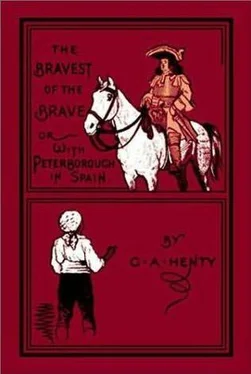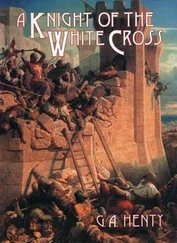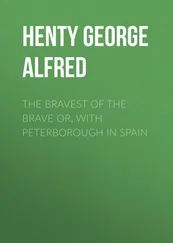In vain the officers remonstrated, the earl was firm. The council then broke up, and the troops prepared for their march in opposite directions.
The parting of Peterborough and his officers was very sad, for they doubted not it was a final one.
"I will yet endeavor," he said, "however our circumstances seem desperate, to secure the kingdom of Valencia; and since the king has thought conquest possible in this present case, he cannot complain of my motions, however rash they might appear. I am resolved, therefore, never to repass the Ebro without positive orders from him."
Before starting the earl wrote to Charles and explained fully his intentions. It is evident from the tone of his letter that Peterborough did not expect to survive this extraordinary expedition. The language is grave and firm, and, though respectful, full of stronger remonstrance and more homely advice than often reaches kings. It concluded:
"I have had but little share in your councils. If our advance had been approved, if your majesty had trusted us... if your majesty had permitted me to march into the kingdom of Valencia, when I so earnestly desired it, without making me stay under pretense of the march of imaginary troops; if your majesty would have believed me on that occasion, your majesty would have had this time not only a viceroy of Valencia but the kingdom. With what force I have I am going to march straight to Valencia. I can take no other measures, leaving the rest to Providence. The time lost (so much against my inclination) exposes me to a sacrifice, at least I will perish with honor, and as a man deserving a better fate."
The earl now again sent orders to one thousand Spanish foot and three hundred horse, which had before been nominally placed at his disposal, but had never moved from the town in which they were garrisoned, to follow him into Valencia; and at the same time he wrote to Colonel Wills to march immediately with a like number of English horse and foot to his assistance.
The king, on the receipt of Peterborough's letter, issued positive and peremptory orders that the Spanish troops were at once to be set in motion. Colonel Wills wrote in reply that an important action had taken place at San Esteban de Litera on the 26th and 27th of January, between General Conyngham with his brigade and the Chevalier d'Asfeldt, in which, after a bloody contest, the French were driven from the field with a heavy loss of killed, wounded, and prisoners, the allies had also suffered serious loss, and General Conyngham had received a mortal wound. The command, therefore, had devolved upon himself.
Having seen the infantry march off, Peterborough, attended only by his two aides de camp, took his place at the head of his handful of cavalry and proceeded on his desperate enterprise--an enterprise the most extraordinary that has ever taken place between enemies of an equal degree of civilization. It was a war of a general with a small escort, but literally without an army, against able officers with thousands of disciplined troops and numerous defensible towns and positions, against enormous difficulties of country, against want and fatigue in every shape, and above all, against hope itself.
And yet no one who had witnessed that little body march off would have supposed that they were entering upon what seemed an impossible expedition--an expedition from which none could come back alive. Worn out and sorry as was the appearance of the horses, ragged and dirty that of their riders, the latter were in high spirits. The contagion of the extraordinary energy and audacity of their chief had spread among them; they had an absolute confidence in his genius, and they entered upon the romantic enterprise with the ardor of schoolboys.
Not less was the spirit of the two young aides de camp. Before starting the earl had offered them the option of marching away with the infantry.
"It is not that I doubt your courage, lads, for I marked you both under fire at Montjuich, but the fatigues will be terrible. You have already supported, in a manner which has surprised me, the work which you have undergone. You have already borne far more than your full share of the hardships of the campaign, and I have, in my dispatches, expressed a very strong opinion to the government as to the value of the services you have rendered. You are both very young, and I should be sorry to see your lives sacrificed in such an enterprise as that I am undertaking, and shall think no less of you if you elect now to have a period of rest."
The young men had, however, so firmly and emphatically declined to leave him that the earl had accepted their continued service.
The cavalry, instead of keeping in a compact body, were broken up into parties of ten, all of whom followed different roads, spreading, through every hamlet they passed, the news that a great army, of which they were the forerunners, was following hotly behind. So that should any peasants favorable to Philip's cause carry the news to Las Torres, that general would be forced to believe that he was being pursued by a veritable army. Many stragglers of the retreating force were picked up and handed over to the peasantry to be sent as prisoners into Catalonia.
For the most part the little parties of cavalry were well received by the populace; the majority of Valencians were in favor of King Charles, and that night, when they halted, the weary horses obtained ample supplies of grain and forage, and the troopers were made welcome to the best the villages afforded.
A few extra horses were purchased by Peterborough during the day, and it was well for his aides de camp that it was so, for scarcely had they finished their meal than Peterborough ordered them again into the saddle. They were to ride by crossroads right and left to the villages where the different detachments had been ordered to halt, and to tell them the routes marked out for them by which they would again concentrate at midday, so as to ride in comparatively strong force through a small town on the main road, whence news might, not improbably, be sent on to Las Torres. After that they were again to disperse and pervade the country.
Jack and Graham carried out these orders, taking guides from each village through which they passed to the next, and it was near midnight before they had finished their work. At four in the morning every detachment was in motion, and at noon the troop was again concentrated. Here the earl learned that a detachment of the enemy had remained behind at Alcala, and, instead of carrying out his previous plan, he rode straight with the whole of his dragoons to that town. When he approached it he divided his force into three bodies, which entered the place simultaneously by different gates, and the Spanish detachment, two hundred strong, at once laid down their arms.
Evening was now approaching, and as the horses and dragoons were utterly worn out, Peterborough halted for the night. He at once called together the principal inhabitants, and informed them that he required all the horses in the town, with such saddlery as they could obtain, to be collected and forwarded for his use to a point he named.
The next morning the march was continued. Las Torres had continued his flight, and this was hastened when he heard of the capture of Alcala. He pushed through the town of Borriol and hastened on to Villa Real, a town strongly favorable to King Charles. It opened its gates, however, on the solemn promise of Las Torres to respect the life and property of the inhabitants; but no sooner had his troops entered than he gave the order for a general massacre and the sack of the town. This ferocious order was executed, and very few of the inhabitants escaped with their lives.
The following day, on the news coming in from various points in his rear that the enemy were pressing after him, he marched his dispirited army to Nules, where the inhabitants were well affected. In answer to his appeal a thousand of the citizens enrolled themselves and undertook to defend the town till the last against the English. Having assured himself of their earnestness Las Torres inspected the muster, and, having viewed all the dispositions for defense, continued his flight. Nules was fortified by strong walls flanked with towers, the fortifications were in an excellent state of defense, and the town could have resisted a siege by a considerable army.
Читать дальше












